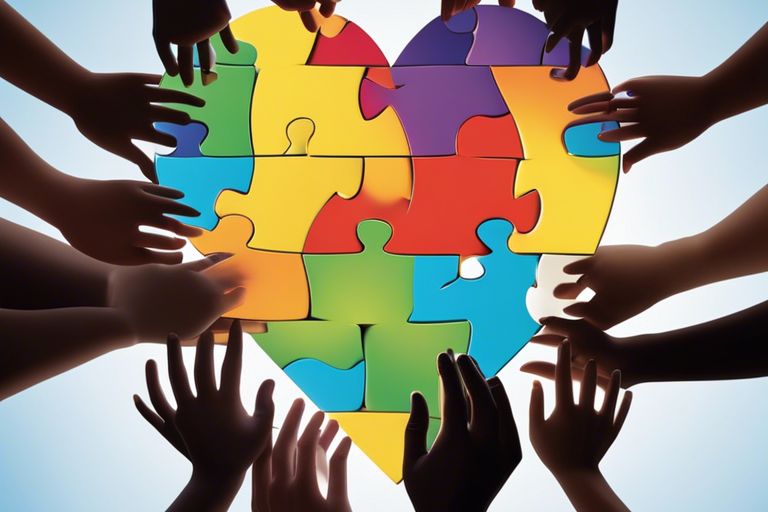Autism is a neurodevelopmental disorder that affects individuals, families, and society on various levels. Individuals diagnosed with autism often face challenges in communication, social interaction, and repetitive behaviours. This can impact their daily lives, education, and employment opportunities. For families, caring for a loved one with autism can be rewarding yet demanding, requiring patience, understanding, and access to support services. The impact on society involves the need for greater awareness, acceptance, and inclusive practices to accommodate individuals with autism in education, healthcare, and employment settings. Understanding how autism affects individuals, families, and society is crucial in promoting a more inclusive and supportive environment for all.
Key Takeaways:
- Autism affects individuals in various ways, including challenges in social communication, repetitive behaviours, and sensory sensitivities.
- Families with a member who has autism often experience higher levels of stress, financial strain, and difficulties accessing support services.
- Society needs to promote understanding, acceptance, and inclusion of individuals with autism to create a more accessible and supportive environment for all.

How Autism Affects Individuals
Developmental Challenges
Individuals with autism often face significant developmental challenges that can impact various areas of their lives. This can include difficulties in communication, social interaction, repetitive behaviours, and sensory sensitivities. These challenges can affect their ability to learn, adapt to new situations, and engage in everyday activities.
Moreover, individuals with autism may experience delays in reaching developmental milestones such as speaking their first words, making eye contact, or forming relationships with others. These delays can lead to frustration, decreased self-esteem, and increased levels of anxiety.
Navigating Social Interactions
Another crucial aspect of how autism affects individuals is in navigating social interactions. Due to difficulties in understanding social cues, body language, and unwritten social rules, individuals with autism may struggle to form friendships and maintain relationships. This can lead to feelings of isolation, loneliness, and social rejection.
Furthermore, challenges in social interactions can impact various areas of their lives, from educational settings to employment opportunities. It is essential to provide support and interventions to help individuals with autism develop their social skills and navigate social situations more effectively.
The Impact of Autism on Families
Emotional Dynamics
When a family member is diagnosed with autism, it can bring about a range of emotional challenges for the entire family. Parents may experience feelings of grief, guilt, and stress as they navigate the complexities of raising a child with autism. Siblings may feel a sense of responsibility or frustration as they try to understand and support their autistic brother or sister.
Family dynamics can also be affected, as the focus may shift towards meeting the needs of the individual with autism, potentially causing tension and conflict within the family unit. It is crucial for families to communicate openly and support each other through these emotional challenges.
Financial and Resource Considerations
Aside from the emotional impact, families also face significant financial challenges when caring for a member with autism. The costs of therapy, medication, specialised education, and other support services can quickly add up, placing a financial strain on the family. In addition to financial considerations, families may also find themselves struggling to access the necessary resources and support networks to help them cope with the demands of caring for a person with autism.
It is important for families to seek out financial assistance and utilise available resources to ensure that their loved one with autism receives the best possible care. By advocating for their needs and seeking community support, families can better navigate the financial and resource challenges associated with autism.
Autism’s Societal Implications
Education and Employment
Autism poses significant challenges in the realms of education and employment. Many individuals on the autism spectrum face barriers in accessing appropriate education and striving for meaningful employment opportunities. They may struggle with communication, social interaction, and sensory issues that can impact their academic performance and ability to secure and maintain jobs.
Employers and educational institutions need to provide adequate support and accommodations to help individuals with autism thrive in these environments. With the right assistance and understanding, individuals on the autism spectrum can make valuable contributions to workplaces and educational settings.
Community and Inclusion Efforts
Community and inclusion efforts play a crucial role in supporting individuals with autism to lead fulfilling lives. Creating inclusive communities that embrace neurodiversity is essential for promoting acceptance and understanding. By fostering a culture of inclusivity, we can ensure that individuals with autism feel valued and supported in society.
Community organisations and advocacy groups often spearhead initiatives to raise awareness about autism and promote inclusion. Collaboration between these groups and local authorities can lead to the development of autism-friendly spaces and activities that cater to the needs of individuals on the spectrum.

Strategies for Support
Therapeutic Interventions
Therapeutic interventions play a crucial role in supporting individuals with autism. Behavioural therapy focuses on improving specific behaviours by using techniques to encourage desirable actions and discourage unwanted ones. Speech and language therapy helps individuals improve communication skills, while occupational therapy assists in developing everyday tasks and motor skills. These interventions are tailored to the individual’s needs and can significantly improve their quality of life.
Furthermore, applied behaviour analysis (ABA) is a widely used therapeutic intervention for individuals with autism. ABA involves breaking down complex tasks into smaller steps and using positive reinforcement to teach new skills. This evidence-based approach has shown remarkable success in helping individuals with autism learn new behaviours and improve their social interactions.
Advocacy and Policy Measures
Advocacy and policy measures are vital for ensuring individuals with autism receive the support they need. Advocacy groups work tirelessly to raise awareness, promote acceptance, and advocate for the rights of individuals with autism. Government policies play a crucial role in providing funding for services, education, and research in the field of autism. By advocating for inclusive policies and implementing anti-discrimination laws, society can create a more supportive environment for individuals with autism.
Efforts to promote autism-friendly environments in schools, workplaces, and communities are essential to ensure individuals with autism can thrive. By raising awareness about autism and advocating for inclusive practices, we can create a more accepting and accommodating society for individuals with autism.

Conclusion: Effects of Autism on Individuals, Families, and Society
Autism has a significant impact not only on individuals diagnosed with the condition but also on their families and society as a whole. Individuals with autism face challenges in communication, social interaction, and behaviour, affecting their daily lives and opportunities for employment and independent living. Families of individuals with autism often experience emotional, financial, and social burdens while providing care and support. Additionally, society must work towards creating inclusive environments and providing necessary support services to accommodate the diverse needs of individuals with autism. By raising awareness, promoting acceptance, and ensuring access to appropriate resources, we can create a more inclusive society that supports the well-being and development of all individuals affected by autism.
FAQ
Q: What is autism?
A: Autism, or Autism Spectrum Disorder (ASD), is a complex developmental condition that affects communication, social interaction, and behaviour.
Q: How common is autism?
A: Autism is estimated to affect around 1 in 100 people, making it more common than previously believed.
Q: How does autism impact individuals?
A: Autism can impact individuals in various ways, including challenges in social interaction, communication difficulties, and repetitive behaviours or interests.
Q: How does autism affect families?
A: Families of individuals with autism may experience increased stress, financial strain, and need to navigate support services to meet the unique needs of their loved one.
Q: What is the impact of autism on society?
A: Autism can have a significant impact on society by requiring specialised services, increasing demand on healthcare and educational systems, and raising awareness about neurodiversity.
Q: How can society support individuals with autism?
A: Society can support individuals with autism by promoting inclusion, providing appropriate accommodations, raising awareness to reduce stigma, and investing in research and support services.
Q: What are some common misconceptions about autism?
A: Common misconceptions about autism include the idea that all individuals with autism have extraordinary abilities or that it is solely a childhood disorder. It is essential to dispel myths and promote accurate understanding of autism.







